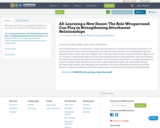
This workshop will focus on attachment concepts and how teams can use them in the Wraparound process.
- Subject:
- Social Science
- Material Type:
- Lecture Notes
- Date Added:
- 06/14/2016

This workshop will focus on attachment concepts and how teams can use them in the Wraparound process.
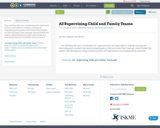
This workshop will cover considerations for supervisors who are responsible for training; coaching and supervising team members that attend and participate in Child and Family Team meetings. Several models that support staff development; family-centered practice; and organizational accountability will be presented.
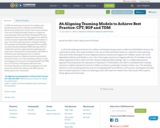
In 2018; the landscape of services for children and families being served in California Child Welfare Services has continued to evolve. One recent evolution is the use of Child and Family Teams as a vehicle for team planning. Child and Family Teaming (CFT) must integrate practices; services and supports for children; youth; non-minor dependents (NM Ds) and families in care. Two of the major practices to integrate with the CFT mandate include Safety Organized Practice (SOP) and Team Decision-Making (TDM) meetings. SOP is a collaborative practice approach that emphasizes the importance of teamwork in child welfare; and TDM is a facilitated team meeting structure to address placement issues for children involved or potentially involved in foster care. This workshop will focus on the promising practices and art of integrating SOP and TDM into a CFT process. Participants will leave with increased capacity to create one teaming process that meets the needs of the child; youth; NM D; parent; family agency and community.
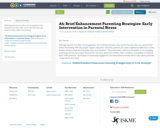
Although parents are often not recognized in the treatment process, they can be the ones who can improve their child’s functioning.
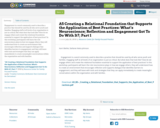
Engagement is a word commonly used to describe a practice that should be used by all who serve youth and families. Engaging staff at all levels of an organization is just as critical. But what does that look like? How do we engage others and create the relational foundation essential to support the application of best practices? In this workshop; participants will learn the role neuroscience plays in how we engage others; they will understand how to create an environment that encourages reflection and supports dialogue that identifies barriers to engagement; and they will leave with tools and strategies that they can apply immediately to create meaningful conversations within the organization and with families.

The focus of this workshop will be to discuss the Medi Cal and CalFresh program for Former Foster Youth (FFY).

Plan to attend this highly interactive workshop if you have been wondering how to propel yourself forward and achieve your goals and objectives by aligning the outcomes you desire with your greatest natural talents and strengths. Discover what Gallup; Inc. has done with critical thinking to support us in learning to tap into who we already are to maximize our productivity! Be willing to practice some basic coaching skills with colleagues in this session. If you are experiencing a transition in your life (professionally or personally); leave this session inspired to take your next steps--moving into action toward making that significant difference you desire to make in the lives of the people we serve!
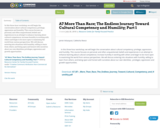
In this three-hour workshop; we will begin the conversation about cultural competency; privilege; oppression and humility. This course focuses on personal; and often unquestioned; beliefs and experiences in an attempt to enhance learning about cultural competence; increase humility in working with others and begin to be more open to examining the world from various perspectives. We will discuss entering into situations with humility; willing to learn from others; and being open and honest with ourselves about our own identities; privileges; oppression and growth opportunities.

In December 2011; the State of California entered into a settlement agreement of the class action lawsuit Katie A v. Bonta. Therapeutic Foster Care (TFC) is one of the Specialty Mental Health Services that became available as a result of this settlement. This workshop will provide background as to how California’s TFC service model; TFC parent training topics and learning objectives evolved. Presenters will walk participants through the TFC Training Resource Toolkit; which was created to provide information and resources to assist TFC agencies to develop a TFC parent training program.
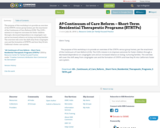
The purpose of this workshop is to provide an overview of the STRTPs versus group homes; per the enactment of the Continuum of Care Reform (CCR). The CCR’s mission is to improve outcomes for foster children through a decreased dependence on congregate care and an increased reliance on loving; nurturing families. The overview will cover the shift away from congregate care and the formation of STRTPs and how they fit into California’s foster care system.

This interactive workshop explores youth adult partnership as a model for engaging youth, how to prepare and support youth for participation in meetings, and techniques for facilitating meetings which involve youth.
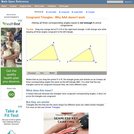
An interactive applet and associated web page that shows that angle-angle-angle (AAA) is not enough to prove congruence. The applet shows two triangles, one of which can be dragged to resize it, showing that although they have the same angles they are not the same size and thus not congruent. The web page describes all this and has links to other related pages. Applet can be enlarged to full screen size for use with a classroom projector. This resource is a component of the Math Open Reference Interactive Geometry textbook project at http://www.mathopenref.com.
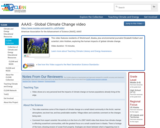
This video features residents of Shishmaref, Alaska, plus environmental journalist Elizabeth Kolbert and scientist John Holdren, exploring the human impacts of global climate change.
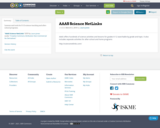
Lessons and tools for K-12 science teaching and after-school programs.
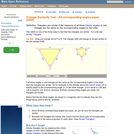
An interactive applet and associated web page showing how the AAA similarity test works. Two similar triangles are shown that can be resized by dragging. The other triangle adjusts to remain similar and the angle-angle-angle elements are highlighted to show how they are involved in this test of similarity. (all three interior angles congruent). The web page describes all this and has links to other related pages. Applet can be enlarged to full screen size for use with a classroom projector. This resource is a component of the Math Open Reference interactive geometry reference book project at http://www.mathopenref.com.

Through this unit, students will explore Asian American and Pacific Islander (“AAPI”) women’s poetry in order to craft and inspire their own poetry. After analyzing and interpreting poems, students recognize poetry as a vehicle to express their own untold stories about events small and large.
This unit will expose students to voices of AAPI women poets. Their experiences will help facilitate a dialogue of identity, beauty, tradition and activism. Many students face these issues during this pivotal time of their development.
Furthermore, this unit will help students explore their viewpoints as they craft and design their own poems and explore the readings. This unit allows students of all abilities and intersectionalities to make their voices heard and draw from their unique perspectives.
2021 Social Science Standards Integrated with Ethnic Studies:
Civics and Government: 7.5, HS.2, HS.11
Geography: 6.14, HS.51
Historical Knowledge: 6.21, 8.22, 8.25, HS.63, HS.64, HS.65, HS.66
Historical Thinking: 7.25, 8.32
Social Science Analysis: 6.24, 6.27, 7.28, 7.29, 8.36, HS.78
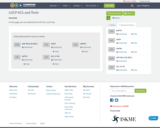
On this page, you can download the AAP LOCP ACL and Tools
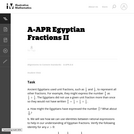
This is a task from the Illustrative Mathematics website that is one part of a complete illustration of the standard to which it is aligned. Each task has at least one solution and some commentary that addresses important asects of the task and its potential use. Here are the first few lines of the commentary for this task: Ancient Egyptians used unit fractions, such as $\frac{1}{2}$ and $\frac{1}{3}$, to represent all other fractions. For example, they might express the n...
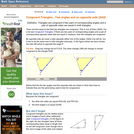
An interactive applet and associated web page that shows how triangles that have two angles and a non-included side the same must be congruent. The applet shows two triangles, one of which can be reshaped by dragging any vertex. The other changes to remain congruent to it and the two angles and non-included side are outlined in bold to show they are the same measure and are the elements being used to prove congruence. The web page describes all this and has links to other related pages. Applet can be enlarged to full screen size for use with a classroom projector. This resource is a component of the Math Open Reference Interactive Geometry textbook project at http://www.mathopenref.com.

This assignment is intended to encourage students to explore relevant jobs in the Information Technology arena post the completion of their A.A.S degree.